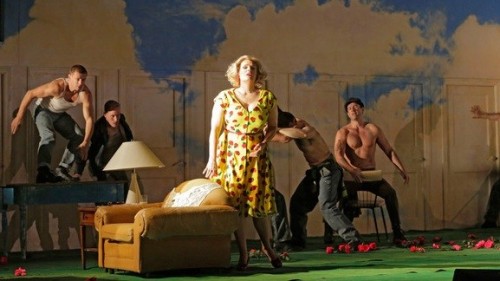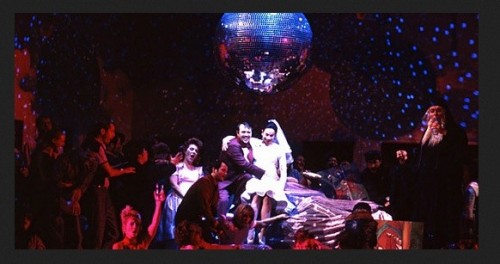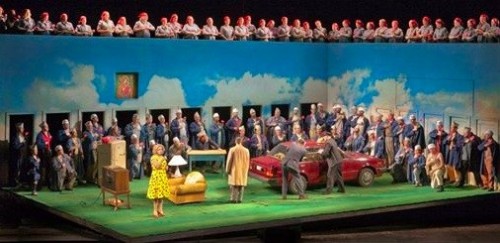James Conlon Conducts a Brilliant Shostakovich
Lady Macbeth Morphs with Chatterley at the Met
By: Susan Hall - Nov 27, 2014
Lady Macbeth of Mtsensk
Dmitri Shostakovich
Conducted by James Conlon
Metropolitan Opera House
New York, New York
November 25, 2014
The Lady, Katerina, may be bored like Oblomov, flung over her chair, legs thrust open and waiting for something to happen. But she is driven by the same unfulfilled sexual desires as Lady Chatterley, who was put down on the page four years before Shostakovich's opera was first produced.
At the Metropolitan Opera's Graham Vick's production from the mid 1990s is perfect.
First and foremost is James Conlon, who conducted the Lady when it was first introduced to the Met. He has conducted almost 300 times there and is certainly America's reigning opera conductor and arguably orchestra conductor as well.
The presence of Brandon Jovanovich in the cast is in part due to his promotion by Conlon in concert with other musical directors in Chicago. Five years ago, Jovanovich was a very handsome, very good Broadway singer. Now he has emerged as one of the best tenors singing today. In Chicago last year, he was brilliant as the Prince in Rusalka. To his always superb acting talent comes a rich operatic voice.
Conlon is retiring from Ravinia, the summer home of the Chicago Symphony. He has said that he wants to have enough spare time to learn Russian. He is clearly able to sing in that tongue, as he led the Met Orchestra and sang every note of the opera at the same time. In a musically complex piece, with sounds ranging from guttural burps to lovely melodies, Conlon held not only the orchestra and the music together, but the singers and dancers as well. This monumental job is done with passion and precision.
Eva Marie Westbroek, an Anna Nicole Smith too, resists the advances of her father-in-law, who has dismissed his son who can't produce a son, to fix the dam on the property outside Moscow. In a brilliant sun yellow dress and described as brighter than the sun, Westbroek's lush soprano wraps itself around any man that crosses her path, and fixes on a serf, Sergei.
Her desire for sex leads her to murder and she extinguishes herself in jealousy at the end, taking her current competitor with her down the drain. Lady Chatterley of course went for a gamekeeper and was not prompted to kill her disabled husband.
The assistant stage directors credited with this iteration deserve much credit. David Kneuss, Yefin Maizel and Peter McClintock have played much of the drama for humor, and camp it certainly is. Sobering too, class warfare ever present.
The set smacks of the 90's, with white clouds, robin’s egg blue skies, pink satin sheets and so on. The two-walled playing area is inserted akimbo, displaced in the fashion of the day for its dramatic effect. The ninety degree juncture of the walls places the corner in our direct view. There the burial pile of multi-colored grocery bags are like a triangular Christmas tree. Sixteen doors open and close for the chorus in various guises -- as police officers and Russian military. Unlike the useless doors of some more recent Met productions, these function with dramatic meaning.
The position of the stage insert also enables us to see large vehicles, a car and also a tractor, enter and exit.
The upper part of the stage is used to promenade guards supervising the proceedings below and also as an exit and entrance for offstage characters like a cook who comes down to be raped.
Seductive and humorous touches abound. Sergei and Katerina are left in their wedding garb as they march to Siberia, accused of the murder of Katerina's husband. Sergie exits complaining that this was not the outcome he had bargained for. Her white veil dominates the scene in which prisoners wear yellow jackets with the military in brown.
The Russian singers in the cast, the father in law, the husband, and the Tart in the Siberian marching line were perfect.
Shostakovich sadly did not write another opera after Lady Macbeth. It has great initial success in Russia, but after Stalin attended a performance in 1936 it was banned. Fortunately it has enjoyed much deserved success in recent years.





